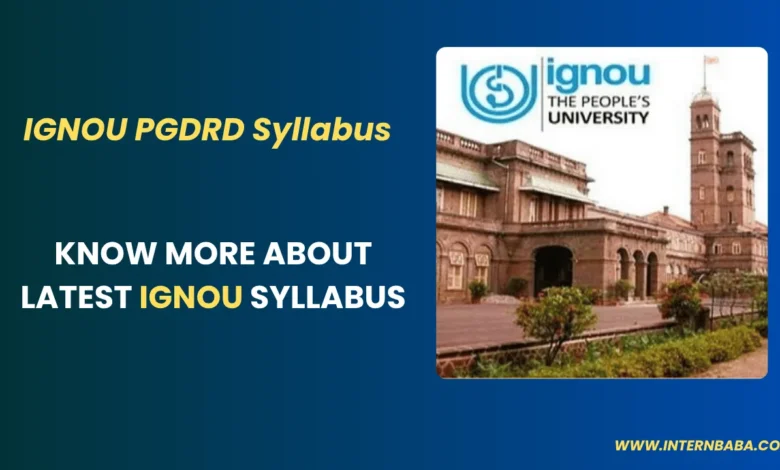IGNOU PGDRD Syllabus 2025

If you’re planning to pursue the Post Graduate Diploma in Rural Development (PGDRD) from IGNOU in 2025, you’ve made a wise choice. This diploma program is ideal for students and professionals aiming to make a difference in rural development and social sectors. However, before diving into your academic journey, it’s essential to understand the program’s updated structure, credit system, and subject list. IGNOU has adopted a flexible credit-based system, making it easier for students to plan and customize their studies. This article will walk you through the entire IGNOU PGDRD Syllabus 2025, offering everything you need to succeed—from course selection to credit distribution, subject breakdown, and answers to frequently asked questions.
Highlights of IGNOU PGDRD Programme 2025
| Component | Details |
|---|---|
| Program Name | Post Graduate Diploma in Rural Development |
| Exam System | Annual |
| Total Credits Required | 30 |
| Program Category | PGDRD |
Students must complete 30 credits to earn the PGDRD diploma. These credits are distributed among compulsory and optional courses. Elective flexibility may vary depending on IGNOU’s course offerings in a given year.
IGNOU PGDRD Credit System Explained
The IGNOU credit system is a unique feature that provides flexibility and clarity to students. Each course under the PGDRD program is assigned a specific number of credits. One credit typically represents 30 hours of learning, including reading, activities, assignments, and self-assessment.
To complete the diploma, a student must successfully earn all 30 credits by passing core and any elective courses provided.
Benefits of the Credit System:
- Flexible learning pace: Study at your own convenience.
- Easy tracking: Helps you keep track of completed and pending credits.
- Course planning: Assists in selecting courses each semester or academic year.
This system ensures that you only move ahead once you’re ready, making education more meaningful and result-oriented.
IGNOU PGDRD Course Structure (Subject List)
The PGDRD program covers a wide spectrum of rural development topics, from policy and planning to implementation. Below is the current list of subjects in the IGNOU PGDRD program for 2025:
| Course Code | Course Title | Credits |
| MRD-101 | Rural Development: Indian Context | 6 |
| MRD-102 | Rural Development Programmes | 6 |
| MRD-103 | Rural Development – Planning and Management | 6 |
| RDD-6 | Rural Health Care | 6 |
| RDD-7 | Communication for Rural Development | 6 |
Note: Subject offerings are subject to change. Always check the latest updates from IGNOU.
These courses are designed to equip students with both theoretical knowledge and practical skills in rural planning, implementation, governance, and communication.
Course Selection and Re-registration Process
IGNOU offers flexibility in course selection, especially during fresh admission and re-registration. Students can choose the subjects they wish to study in a given year or semester.
Steps for Effective Course Selection:
- Review the subject list and their credit values.
- Choose compulsory and available elective courses as per the required credit total.
- Ensure the chosen subjects align with your career goals.
- For re-registration, verify completed credits and remaining subjects.
Tip: IGNOU may revise subjects occasionally to reflect current rural development trends, so staying updated is important.
Who Should Choose PGDRD?
This program is especially beneficial for:
- Fresh graduates exploring careers in development and social sectors.
- Government employees in rural departments.
- NGO professionals and social workers.
- Students aiming to pursue further studies (Master’s/Ph.D.) in rural or social development.
The curriculum is aligned with real-world scenarios, helping learners apply theoretical concepts in practical settings.
Career Scope After PGDRD
A PGDRD certification from IGNOU opens up a variety of job roles, including:
- Rural Development Officer
- Project Coordinator in NGOs
- Community Mobilizer
- Research Assistant in Social Projects
- Policy Advisor or Analyst
The program also serves as a stepping stone for various competitive exams and civil services, especially those focusing on rural and social welfare sectors.
Useful Tips for PGDRD Students
- Plan Early: Review your syllabus and credit system right after admission.
- Keep Records: Maintain a file of your credits, assignments, and grades.
- Use eGyankosh: Download all official study material from eGyankosh.
- Join Online Groups: There are many student forums that discuss topics, assignments, and exam prep.
- Consult Faculty: Make use of IGNOU’s support system for guidance on coursework and exams.
Frequently Asked Questions (FAQs)
Q1. How many total credits are required to complete the PGDRD program?
A. A total of 30 credits are required to successfully complete the diploma.
Q2. Is there any flexibility in choosing subjects for PGDRD?
A. Yes, IGNOU offers some elective flexibility, but core subjects must be completed as specified.
Q3. In what medium is the PGDRD program offered?
A. The program is available in both English and Hindi.
Q4. Can I complete PGDRD in one year?
A. Yes, the minimum duration of the program is one year, though it can be extended if needed.
Q5. Where can I find the latest syllabus and study materials?
A. You can find official syllabus updates and study materials on the IGNOU website or the eGyankosh portal.
For the most reliable and up-to-date information, always refer to official IGNOU resources. Staying proactive and well-informed will help you navigate your PGDRD journey smoothly and successfully.







